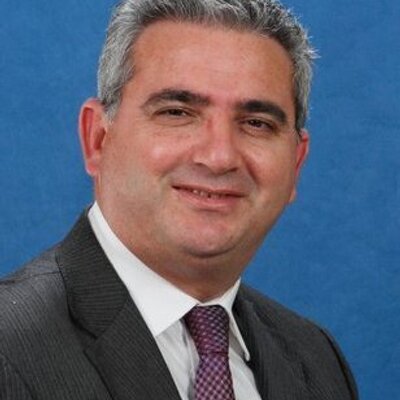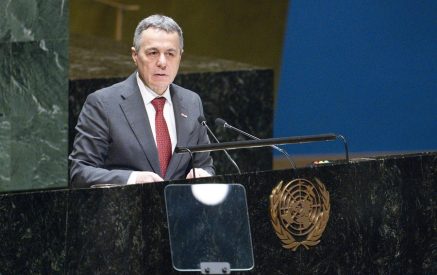This opinion article originally appeared in New Europe.
By Kyriakos Hadjiyianni (MP, Cyprus)
Thinking back on the fall of communism in Europe, images that most often come to mind are probably those of East Germans chipping chunks of stone away from the Berlin Wall or tanks in Moscow’s Red Square. Less common would be images of Soviet Premier Leonid Brezhnev, West German Chancellor Helmut Schmidt, East German Chairman Erich Honecker and U.S. President Gerald Ford signing a document in the capital of Finland outlining a detailed set of principles for East-West co-operation.
Yet, it was the signing of that document in 1975 – known as the Helsinki Final Act or Helsinki Accords – that led a decade and a half later to the toppling of communist dictatorships and a new era of international relations that placed human rights at its core.
Read also
Inspired by the commitments to fundamental freedoms outlined in the document, human rights activists in the 1970s and 80s set up “Helsinki watch groups” across Europe to monitor compliance. In this way, the Helsinki Final Act led to increasingly emboldened voices for democratic reform and ultimately to the opening up of societies. Following the collapse of communism, the document served as the basis of the founding of the Organization for Security and Co-operation in Europe (OSCE), where I now serve as rapporteur of the Parliamentary Assembly’s human rights committee.
What this history demonstrates is that making human rights a foreign policy priority can have extensive and multifaceted effects that potentially reach far beyond the immediate impact of freeing a political prisoner or protecting a persecuted minority. There are ripple effects that go well beyond individual cases of human rights and can have profound and positive impacts on the international landscape.
Unfortunately, however, the rise of populism and nationalism has eroded the once privileged position of human rights. The gradual weakening of international oversight of human rights and democratic standards is exploited not only by oppressive undemocratic regimes, but has also enabled a decline in respect for long-held principles in democratic countries.
Populists and nationalists focus their political discourse on social inequalities, the threat of terrorism, xenophobia, racial bigotry, and religious intolerance. This has led to scapegoating of minorities including Roma and Sinti, a rise of anti-Semitism and Islamophobia, growing anti-migrant sentiment, a rollback of human rights, and a troubling normalization of hatred toward and violence against marginalized groups.
The trend of declining human rights standards has also been greatly exacerbated across our region by the misuse of national states of emergency to temporarily suspend democratic processes. This is a cause of growing concern. As OSCE countries have agreed that their human rights record is a legitimate interest for other countries, the OSCE and other international organizations clearly have a decisive role to play in cases where the declaration of a state of emergency is imminent or in place.
We are currently witnessing the highest number of crises and conflicts since World War II and children bear a disproportionate burden of these conflicts. Much more needs to be done to protect and help these kids, including through the universal ratification and implementation of the Convention on the Rights of the Child, and ensuring that child refugees and migrants are treated with the care that they require. Everything must be done to ensure that protection of children is our first priority.
In a broader sense, all of these trends lead to a basic question: can the system of human rights protection we have inherited survive and prevent a further slide into authoritarianism and the disregard of human rights? The clear answer is yes, if we make adherence to our principles a priority of both domestic and foreign policy and hold accountable those who breach their commitments. This is the overarching mission that I hope to advance this summer at the OSCE Parliamentary Assembly’s Annual Session in Luxembourg.
As rapporteur of the human rights committee, I have tabled a report and draft resolution that will be debated and amended over several days in early July, detailing a range of human rights challenges we face, as well as possible solutions. In the resolution, I urge all OSCE countries to place promotion and protection of human rights at the centre of their domestic as well as their foreign policy agendas and urge national parliaments to publicly hold governments accountable for violations of their OSCE commitments.
While acknowledging that the current system is in crisis and the principles of the Helsinki Final Act are challenged, it should be noted that the nature of human rights protection is evolving and developing. While the overall trend indicates a deprioritizing of human rights principles, I find a source of hope and inspiration in the coalitions of small countries that at times take the lead in defending human rights principles.
In this regard, it is perhaps appropriate that we will meet for our Annual Session this year in one of the smallest OSCE countries, Luxembourg. This demonstrates that all signatory states to the Helsinki Final Act – big or small – have an important voice, and that we all have a role to play in demonstrating leadership in these troubled times.
Kyriakos Hadjiyianni is a member of parliament from Cyprus and serves as rapporteur of the OSCE Parliamentary Assembly’s Committee on Democracy, Human Rights and Humanitarian Questions. For his full report and draft resolution, please click here. Follow him on Twitter: @KHadjiyianni























































